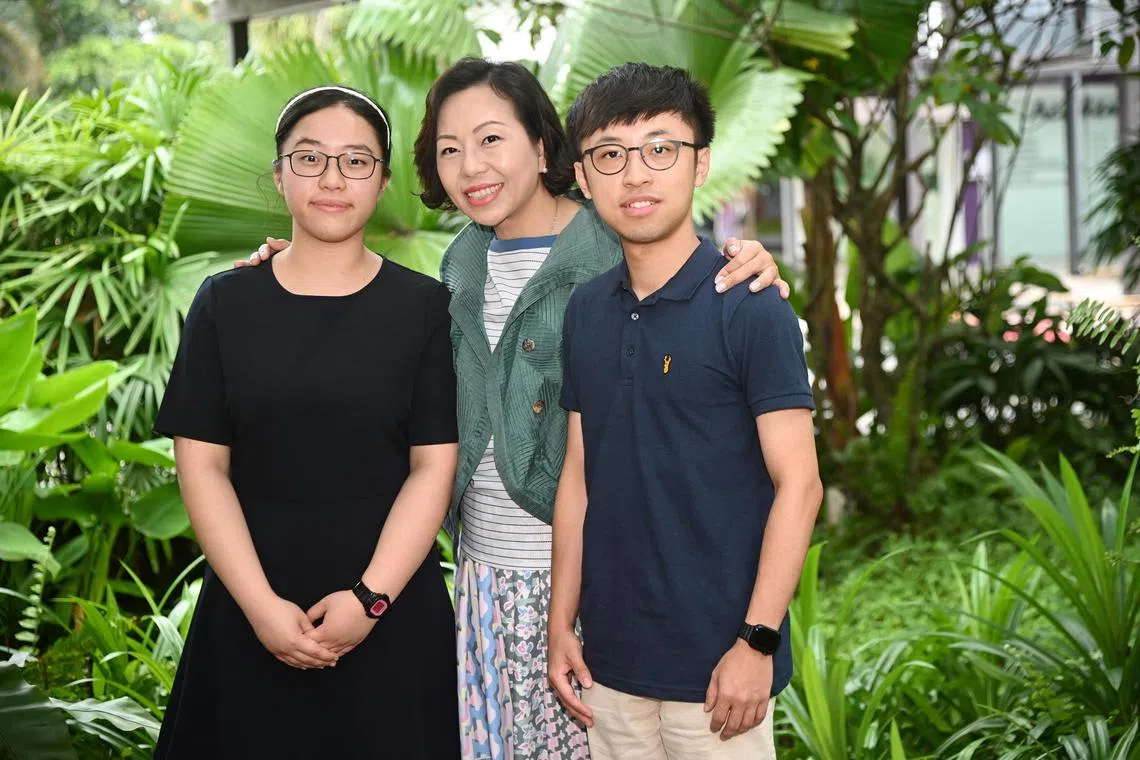Young HK activists who flouted national security law can still hope for a future in the city: Official
Sign up now: Get insights on Asia's fast-moving developments

Hong Kong's Secretary for Home and Youth Affairs Alice Mak (centre) with youth ambassadors Annie Chen and Billy Fong.
ST PHOTO: DESMOND WEE
Follow topic:
SINGAPORE - The young activists who took part in Hong Kong’s disruptive and often-violent pro-democracy protests in recent years still have a future in the city, says the government’s youth affairs official.
The government is also actively reaching out to other young Hong Kongers who were left disillusioned and feel disconnected following the political turmoil through their peers, Secretary for Home and Youth Affairs Alice Mak told The Straits Times.
“They shouldn’t think that their life is over just because they made a mistake in their youth,” Ms Mak said, referring to the young people who violated the law during the social unrest, as she elaborated on parts of Hong Kong’s new youth policy plan.
“They will have to bear the legal consequences. But after that, we will definitely help them to move on.”
The official was in Singapore on a four-day visit till Sunday, leading a delegation of Hong Kong youth ambassadors to meet other young people here. The trip is the first international youth exchange led by her office since the city scrapped all Covid-19 movement controls for returning travellers
The visit came weeks after Ms Mak released Hong Kong’s Youth Development Blueprint, an ambitious plan of 160 actions aimed at alleviating the top challenges facing the city’s young people today, including career prospects, housing and national identity.
Ms Mak said she hoped to help restore harmony in Hong Kong society through sincere outreach to the youth, as she acknowledged that the massive anti-government protests of 2019 had left the city deeply polarised.
The social unrest catalysed Beijing’s imposition of a national security law on Hong Kong in 2020, under which more than 230 – many of them young people – were arrested.
The proportion of Hong Kong’s population aged 20 to 29 shrank nearly 2 percentage points from 2019 to 2022, and the local labour force lost over 116,000 people aged 18 to 39 between 2020 and 2022, according to official data. Many of those who left the financial hub in the past few years cited tight Covid-19 restrictions and a perceived erosion of democratic norms in the city, surveys and media reports show.
Asked how Hong Kong planned to reconnect with its young people who feel estranged from their homeland following the events that have unfolded in recent years, Ms Mak touted her blueprint’s motto to “inspire, support and embrace” the city’s youth.
The city is ready to embrace all its young people, regardless of their past, she said.
Hong Kong is actively nurturing more youth ambassadors, providing them with greater access to policymaking bodies where their views could be registered and taken on board, the official added.
The government was putting so much effort into developing these youth representatives, she said, “because the best way to reach young people is through their peers – these youth ambassadors – who can help us tell our story”.
Youth ambassador Billy Fong, who was part of the delegation with Ms Mak, agreed. He described his recent experience of giving feedback to a government body after he found that some mobile Covid-19 testing centres set up on sports fields were preventing his friends from engaging in their regular sports activities. The authorities acted on his input and subsequently relocated some of those centres.
“I felt like I made a difference,” said Mr Fong, 30.
Another part of Ms Mak’s blueprint for Hong Kong youth involves encouraging them to develop themselves abroad.
While the measure to provide young Hong Kongers with more work and training opportunities on the mainland and overseas may seem at odds with Hong Kong’s efforts to expand its local workforce
“We want to give our youth the opportunity to venture out, to train or intern in other cities, so that they can see for themselves the world outside.
“Their experiences abroad can enlighten them to develop a global perspective, and empower them to return to contribute to the betterment of our city,” she said, adding that the overseas exposure would put the young people in good stead for more career opportunities, allowing them to advance on the social ladder.
University of Hong Kong academic Paul Yip lauded the move. “Even if they don’t come back, they can still be an ambassador of Hong Kong in their own ways,” said Professor Yip, the university’s chair professor in population health and a founding director of the Hong Kong Jockey Club Centre for Suicide Research and Prevention. “We should have a bigger heart and broader mind… Our people don’t have to physically be in Hong Kong to be useful. When they go out, they could be even more useful.”
But he said the government has to act even more proactively to seek out young people’s views if it hopes to successfully reconnect with them and calibrate its policies to better meet their needs.
He gave the example of what he described as a cumbersome and lengthy process for youth to join government advisory committees to influence policymaking. Applicants have to submit an essay and create a video or audio clip promoting themselves just to kick-start the process, which could take as long as a year, he said.
“We cannot come up with any policy for the youth if we do not understand them correctly,” he said, suggesting that officials make the process easier for young people to have their concerns heard.


